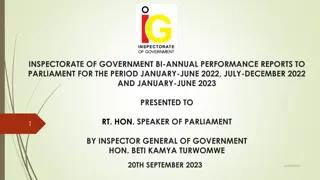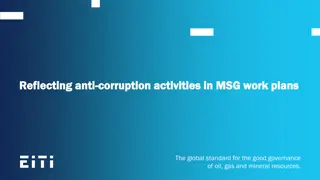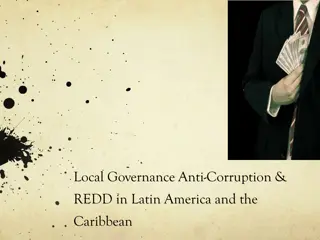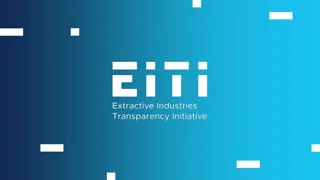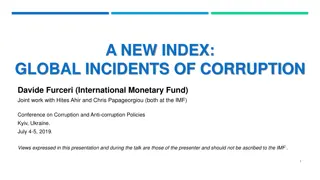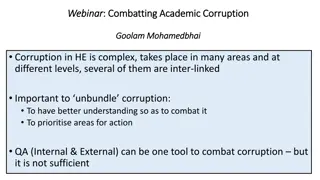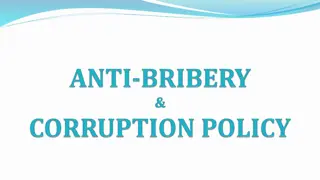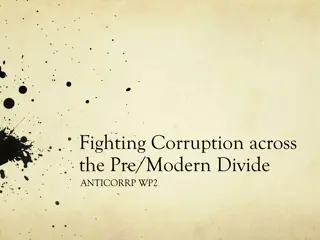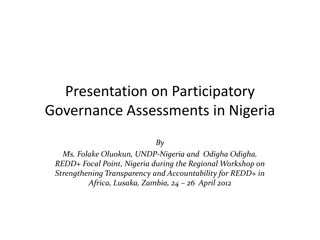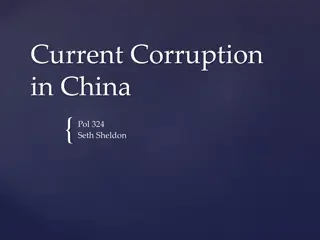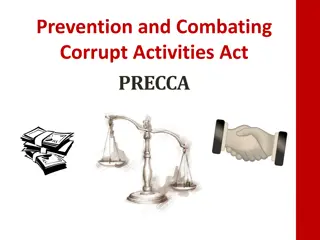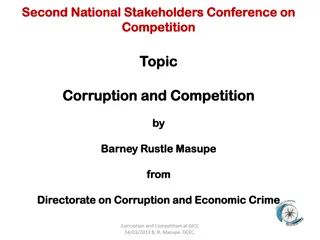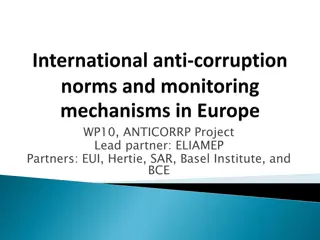
Enhancing Anti-Corruption Efforts in Resource Governance
This discussion delves into strengthening anti-corruption measures in resource governance through the use of license and beneficial ownership data. Explore how this information can help identify corruption risks and red flags. Find out more about the crucial elements in the fight against corruption in the oil, gas, and mineral sectors.
Download Presentation

Please find below an Image/Link to download the presentation.
The content on the website is provided AS IS for your information and personal use only. It may not be sold, licensed, or shared on other websites without obtaining consent from the author. If you encounter any issues during the download, it is possible that the publisher has removed the file from their server.
You are allowed to download the files provided on this website for personal or commercial use, subject to the condition that they are used lawfully. All files are the property of their respective owners.
The content on the website is provided AS IS for your information and personal use only. It may not be sold, licensed, or shared on other websites without obtaining consent from the author.
E N D
Presentation Transcript
Ant Anti i- -corruption corruption training training Licensing, contracts, and beneficial ownership disclosure Septiembre, 2022 The global standard for the good governance of oil, gas and mineral resources.
What What we we will will be be discussing discussing today today I. Data to strengthen anti-corruption efforts: licenses II. The use of license data in identifying corruption risks. III. Beneficial ownership data: an essential element to address corruption IV. The use of beneficial ownership data in identifying corruption risks. These sessions are posible due to the generous support from
I. Data I. Data to to strengthen strengthen anticorruption anticorruption: : licenses licenses Legal framework and legal regime Legal and fiscal framework and reforms Contract and license allocation process Technical and financial criteria Process of awarding or transferring licenses Information about the recipients Any deviations
Register of licenses Coordinates License holders Date of application Date of award Duration of the license Commodity that is being produced
Red Red flags flags that could be identified with these data that could be identified with these data Preferential deals with the government A company's business suddenly takes off or falls apart when the government changes hands, suggesting its hidden owner's political connections were key to its success. A company wins a government contract or license for which it does not seem qualified based on its track record, age, or relatively unknown, inexperienced managers and shareholders. A company receives a contract, license or other favor for example, a tax holiday or import duty waiver that officials in the awarding government typically hand out as patronage. An unqualified indigenous company with unclear ties to officials receives a government contract or license purportedly in the interest of complying with the country's "local content" laws or policies. A company signs a deal at a discounted price or on a single-source basis, outside normal competitive auction or procurement processes. The government does not publicize the deal
The The use of data use of data in in identifying identifying corruption corruption risks risks
II. Beneficial II. Beneficial ownership to to address address corruption corruption ownership data: data: an an essential essential element element Open registry of beneficial owners of the corporate entity(ies) that apply for or hold a participating interest in exploration or production Country of origin Country of residence d) Information about the identity of the beneficial owner should include the name of the beneficial owner, the nationality, and the country of residence, as well as identifying any politically exposed persons. Politically exposed person
Approaches Approaches in in identifying identifying risks risks Red Red flags flags indicating indicating Concealed Beneficial Owners Concealed Beneficial Owners Source: Owning Up: Options for Disclosing the Identities of Beneficial Owners of Extractive Companies, Source: Owning Up: Options for Disclosing the Identities of Beneficial Owners of Extractive Companies, Sayne Sayne, Westenberg, and , Westenberg, and Shafai Shafai (2015, 9) (2015, 9) Talk in the market Rumors circulate that a firm is actually a particular person's company, despite appearances, or is inked or close to a PEP. A news story, NGO report, or court case makes similar claims. Industry insiders or officials will not discuss who owns a company. A little-known person, company, or network of companies keeps cropping up in different deals, suggesting that one beneficial owner has stakes in all of them
Red Red flags flags indicating indicating Concealed Beneficial Owners Concealed Beneficial Owners Noncompliance with industry rules and standards not sanctioned by the government The government does not sanction the company for following types of noncompliance: A company fails to file required paperwork. A company routinely breaks operational regulations. A company never performs its contractual obligations in full, or walks away from an unfinished, over-budget project. Underpayment or nonassessment of taxes and/or fees. Suspect commercial relationships A company engages in high-value transactions with little obvious commercial justification
The The use use of of b beneficial ownership data eneficial ownership data in in identifying identifying corruption corruption risks risks

